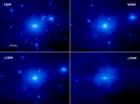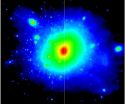(Press-News.org) Scientists believe they have found a way to explain why there are not as many galaxies orbiting the Milky Way as expected.
Computer simulations of the formation of our galaxy suggest that there should be many more, smaller galaxies around the Milky Way than are observed through telescopes.
This has thrown doubt on the generally accepted theory of cold dark matter, a substance that scientists predict should allow for more galaxy formation around the Milky Way than is seen.
Now cosmologists and particle physicists at the Institute for Computational Cosmology (ICC) and the Institute for Particle Physics Phenomenology (IPPP), at Durham University, working with colleagues at LAPTh College & University in France, think they have found a potential solution to the problem.
Writing in the journal Monthly Notices of the Royal Astronomical Society (MNRAS), the scientists suggest that dark matter particles, as well as feeling the force of gravity, could have interacted with photons and neutrinos in the young Universe, causing the dark matter to scatter.
Scientists think clumps of dark matter – or halos – that emerged from the early Universe, trapped the intergalactic gas needed to form stars and galaxies.
Scattering the dark matter particles wipes out the structures that can trap gas, stopping more galaxies from forming around the Milky Way and reducing the number that should exist.
Lead author Dr Celine Boehm, in the Institute for Particle Physics Phenomenology, at, Durham University, said: "We don't know how strong these interactions should be, so this is where our simulations come in.
"By tuning the strength of the scattering of particles, we change the number of small galaxies, which lets us learn more about the physics of dark matter and how it might interact with other particles in the Universe.
"This is an example of how a cosmological measurement, in this case the number of galaxies orbiting the Milky Way, is affected by the microscopic scales of particle physics."
There are several theories about why there are not more galaxies orbiting the Milky Way, which include the idea that heat from the Universe's first stars sterilised the gas needed to form stars.
The researchers say their current findings offer an alternative theory and could provide a novel technique to probe interactions between other particles and cold dark matter.
Co-author Professor Carlton Baugh, in the Institute for Computational Cosmology, at Durham University, said: "Astronomers have long since reached the conclusion that most of the matter in the Universe consists of elementary particles known as dark matter.
"This model can explain how most of the Universe looks, except in our own backyard where it fails miserably.
"The model predicts that there should be many more small satellite galaxies around our Milky Way than we can observe.
"However, by using computer simulations to allow the dark matter to become a little more interactive with the rest of the material in the Universe, such as photons, we can give our cosmic neighbourhood a makeover and we see a remarkable reduction in the number of galaxies around us than originally thought."
The calculations were carried out using the COSMA supercomputer at Durham University, which is part of the UK-wide DiRAC super-computing framework.
INFORMATION:
The work was funded by the Science and Technology Facilities Council and the European Union.
Interactive dark matter could explain Milky Way's missing satellite galaxies
2014-09-09
ELSE PRESS RELEASES FROM THIS DATE:
Study finds tear gas could have temporary impact on lung health
2014-09-09
Munich, Germany: The effects of tear gas are not just short term and could be experienced for up to two weeks after the event, according to a new study.
The study, presented at the European Respiratory Society (ERS) International Congress in Munich today (10 September 2014), investigated the duration of lung health effects in protesters directly exposed to tear gas.
Researchers in Turkey conducted a questionnaire survey with 546 people who had inhaled tear gas during public protests in June 2013. They collected information on smoking history, exposure to tear gas, ...
Fish oil may help curb seizure frequency in epilepsy
2014-09-09
But high doses were no better than dummy (placebo treatment), the findings indicated.
The omega-3 fatty acids found in fish oil are able to cross over from the bloodstream into heart cells where they work to stabilise heart rhythm and protect against heart attacks.
This is particularly important for people with epilepsy because they have a significantly higher risk of having a heart attack than those without the condition.
And experimental research indicates that omega 3 fatty acids can also cross over into the central nervous system, where they reduce the excitability ...
Study of almost 900,000 people shows prediabetes increases the risk of cancer by 15 percent
2014-09-09
A meta-analysis comprising 16 studies and 891,426 participants from various regions of the world shows that prediabetes increases the risk of cancer by 15%, with differing risks depending on the type of cancer. The study, published in Diabetologia (the journal of the European Association for the Study of Diabetes) is by Professor Yuli Huang, The First People's Hospital of Shunde, Daliang Town, Shunde District, China, and colleagues.
Prediabetes is a general term that refers to an intermediate stage between normoglycaemia and overt diabetes mellitus. It includes individuals ...
E-cigarette nicotine refill cartridges pose danger for toddlers
2014-09-09
The safety of nicotine refill cartridges used in electronic cigarettes needs to be improved to prevent toddlers accidentally swallowing the contents and potentially coming to serious harm, warn doctors in Archives of Disease in Childhood.
The warning follows their treatment of a suspected case in the UK and emerging US data on the substantial rise of unintentional nicotine poisoning from e-cigarettes among the under 5s.
The UK toddler was brought into the emergency care department of Good Hope Hospital in Birmingham after the child's mother had spotted her picking up ...
The Lancet Respiratory Medicine: Intermittent montelukast in children aged 10 months to 5 years with wheeze (WAIT trial)
2014-09-09
This study of 1358 children investigated whether intermittent montelukast (a drug widely used to treat wheeze and other asthmatic symptoms) compared with placebo, reduced wheezing episodes in children aged 10 months to 5 years, and whether patient outcome differed according to genotype. Study authors found that intermittent montelukast only reduced wheezing episodes in children with arachidonate 5-lipoxygenase (ALOX5) gene promoter 5/5, a gene that has previously been associated with a better response to montelukast in adults. There was no correlation with reduced wheezing ...
Tip sheet from Annals of Internal Medicine, Sept. 9, 2014
2014-09-09
1. Health insurance not affordable for many under Affordable Care Act
For many younger adults, the penalty for not buying health insurance may be less than the price of the least expensive plan available under the Patient Protection and Affordable Care Act (ACA), according to a study being published in Annals of Internal Medicine. The ACA aims to expand health care coverage in part by providing subsidies to individuals with low annual incomes. The law mandates that individuals purchase health insurance or pay a penalty. The penalty is waived if the cost of the least-expensive ...
Should lung cancer screening be covered for Medicare beneficiaries?
2014-09-09
1. Should lung cancer screening be covered for Medicare beneficiaries?
Experts analyze evidence from the National Lung Screening Trial
Researchers for the Centers for Medicare and Medicaid Services (CMS) analyze evidence on the benefits and harms of lung cancer screening by age in a study being published in Annals of Internal Medicine. Smoking is the most important risk factor for developing lung cancer. The National Lung Screening Trial (NLST) reported a reduction in lung cancer mortality in high-risk participants aged 55 to 74 who were randomly assigned to screening ...
September/October 2014 Annals of Family Medicine Tip Sheet
2014-09-09
Illinois' Medicaid Primary Care Case Management Program Associated With Substantial Savings, Reductions in Inpatient and Emergency Care and Improvements in Quality Measures
Illinois was an early leader in comprehensive Medicaid reform, implementing a primary care case management program, Illinois Health Connect, and a complementary disease management program, Your Healthcare Plus, in 2006. The programs aimed to promote preventive care, reduce the redundancy of services through continuity of care with a primary care provider, and improve the management of chronic diseases. ...
Researchers improve severe asthma care through new, antibody-based treatment
2014-09-09
September 8, 2014 – Hamilton, ON – A team of researchers at McMaster University and St. Joseph's Healthcare Hamilton have successfully evaluated a new, antibody-based drug for certain patients with severe asthma. The drug – named mepolizumab – can replace traditional, steroid-based treatments for a specific subset of patients, resulting in improved outcomes and reduced side effects.
The study and manuscript, published in the New England Journal of Medicine was led in Canada by Dr. Parameswaran Nair, staff respirologist, Firestone Institute for Respiratory Health at ...
Patients with advanced dementia continue receiving medications of questionable benefit
2014-09-08
Bottom Line: More than half of nursing home residents with advanced dementia (a terminal illness marked by severe cognitive impairment and functional dependence) continue to receive medications of questionable benefit (including medications to treat dementia and lower cholesterol) at substantial financial cost.
Author: Jennifer Tjia, M.D., M.S.C.E., of the University of Massachusetts Medical School, Worcester, and colleagues.
Background: The Institute of Medicine recommends clinicians minimize interventions in patients with life-limiting disease and instead focus ...

